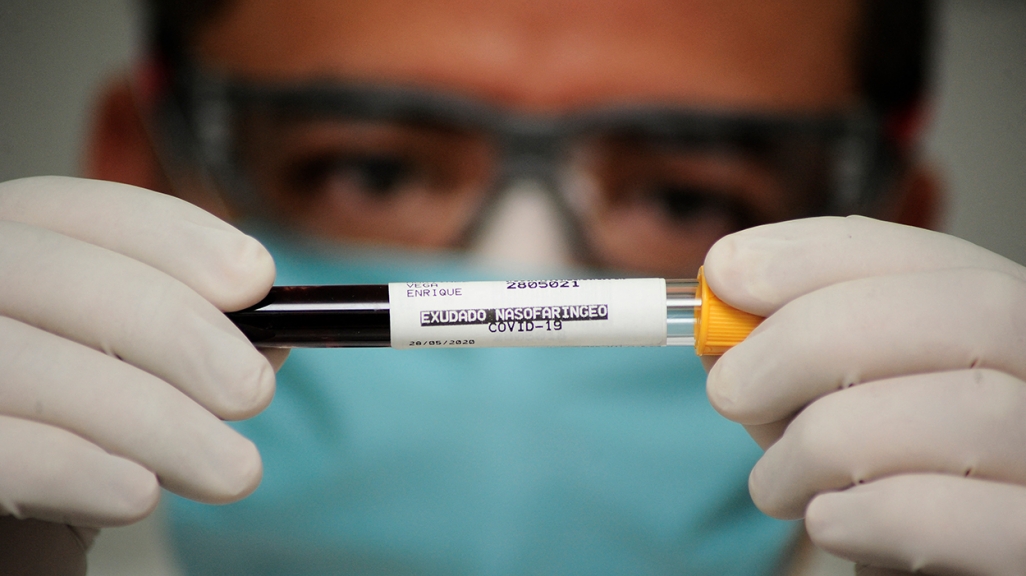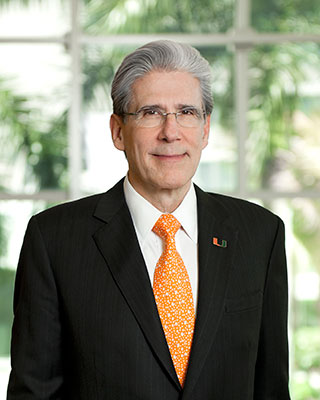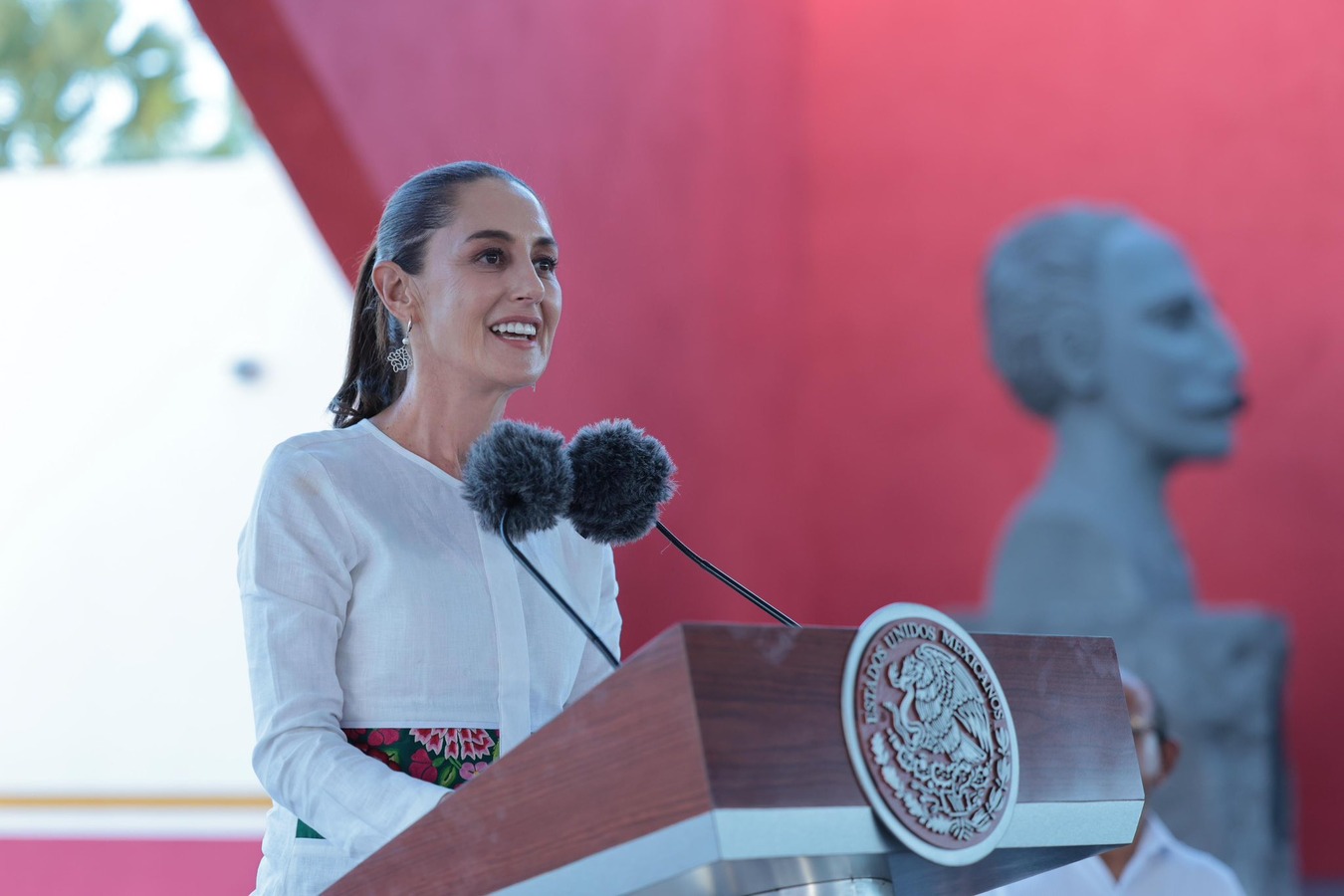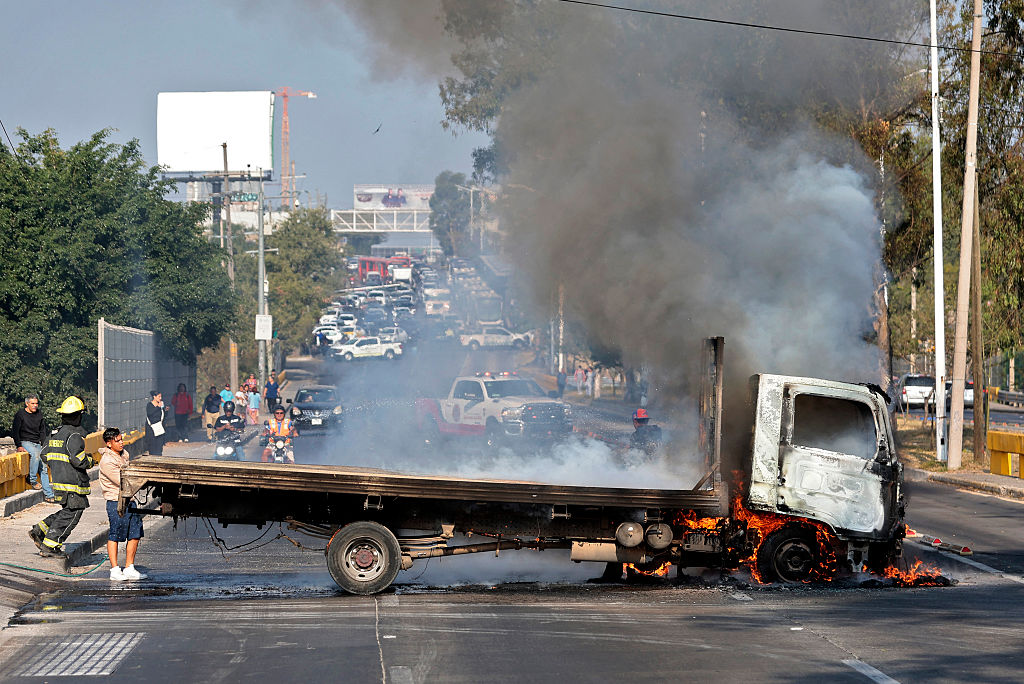LatAm in Focus: Dr. Julio Frenk on the Coronavirus Pandemic in an Age of Populism
LatAm in Focus: Dr. Julio Frenk on the Coronavirus Pandemic in an Age of Populism
“We need to understand that health security is national and global security,” says the University of Miami president and ex-health minister of Mexico.
As most of the world reels from the impact of the coronavirus pandemic, Dr. Julio Frenk told Latin America in Focus: “The sooner you start acting, the better.”
The president of the University of Miami, who also served as Mexico’s health minister and dean of Harvard University’s School of Public Health, says social distancing measures are crucial to stem the pandemic’s spread. “Those do work and the sooner you adopt them, even understanding that they do carry an important social and economic cost, the better off you’re going to be,” he says, pointing to time lost during the first days that COVID-19 hit Italy.
When it comes to countries’ health systems, Dr. Frenk, who has held decision-making roles during a number of pandemics, describes investing in technical competence as “fundamental” for preparedness. “It’s great to have these big hospitals and do heroic surgery to save a life, but the real core of the health system is the public health component and particularly having good epidemiological surveillance systems.” He added that this was a key aspect to controlling the 2009 swine flu epidemic. “Mexico behaved in a very responsible way, and knowing there would be serious economic consequences, immediately reported the outbreak to the World Health Organization, and that again gave time to other countries.”
Dr. Frenk said that, for that reason, the wave of global populism since that outbreak has undermined global readiness on the public health front. “In 2009 the multilateral system was in a much better shape than today,” he told AS/COA Online’s Carin Zissis. “You see that time and again, and it’s happened already with coronavirus: presidents presuming that they know better than their experts.”
“We need to understand that health security is national and global security.”
He also points out what we need to learn from this pandemic. “The stock market has lost trillions of dollars in market capitalization. With a fraction of that we could have competent surveillance and preparedness systems. But again, this is the invisible part of the health system. It’s the thing that we only notice when it fails.”
“I hope this is a wakeup call for people because now it’s hitting home. You cannot engage in this sort of anti-science discourse without eventually paying the price,” says the former World Health Organization executive director. “And, by the way, the way we’re going to get out of this current pandemic is through science.”
New to the podcast? Check out past episodes of Latin America in Focus and subscribe on Apple Podcasts, Google Podcasts, Soundcloud, Spotify, and Stitcher.
Luisa Leme produced this episode. The music in this podcast was performed at Americas Society in New York. Learn more about upcoming concerts at musicoftheamericas.org.
- Lea la entrevista con Dr. Frenk en español.
- Where is the coronavirus in Latin America? Check our map with confirmed cases in the region and how governments are responding to the crisis.
- Video: The Impact of the Coronavirus on Latin America and the Caribbean
- Learn about our Healthcare Series.
At a time when a lot of the world is going into lockdown and many of us are practicing our best social distancing skills, AS/COA Online’s Carin Zissis spoke with Dr. Julio Frenk, the former health minister of Mexico. Dr. Frenk also served as the dean of the Harvard School of Public Health and executive director of Evidence and Information for Policy at the World Health Organization. He is now the president of the University of Miami.
From SARS to the swine flu, he’s been in a public health, decision-making role during a number of pandemics. He discussed how countries can best respond to the current coronavirus pandemic, how they can prepare for future epidemics, and why the current wave of populism around the world threatens our ability to battle global health challenges.
Carin Zissis: The first case of the coronavirus was confirmed in Latin America on February 26. As of March 5, there were cases in six countries. Within days, nearly all countries in the region had confirmed cases. And we’re seeing places such as El Salvador, Colombia, Peru shutting their borders, closing school, restricting large gatherings. In fact, one could say you’re seeing some Latin American countries move faster than the United States did. I'm wondering as a former health minister, what are your views on some of the steps being taken. Do these measures, closing borders, that sort of thing, how do you evaluate them?
Julie Frenk: Well, let me say a couple of things about the nature of the pandemic itself.
First of all, by definition, whenever there’s a novel pathogen, as is this new coronavirus, because it’s new the defining characteristic of the event is uncertainty. We do not know exactly how things are going to progress. But there’s a lot we can learn from previous outbreaks and pandemics. Some of them have been outbreaks of coronaviruses, which are similar to the one that’s circulating. But we do not know exactly how this is going to progress because it’s new. And that means that we need to err on the side of prudence. Yes, other coronaviruses have seasonality, but we cannot just assume that this one is going to go away in the Northern Hemisphere as we move into the spring and the summer. Let's hope that’s what happens, but to assume that that’s going to happen because others have been like that would be a mistake. The uncertainty means we need to actually be especially cautious even as we make all the efforts to understand the characteristics of the coronavirus that’s the subject of this pandemic.
Now we have learned a few things about this one. One, it’s highly contagious. Number two, even people who are asymptomatic or who have very mild symptoms can transmit the disease. And what that means is that alongside the more traditional public health measures where you identify cases, test them and those who are positive, you track their contacts and you isolate them—we need to continue doing that. But for most of the world, we also now need to move into measures of what’s called “social distancing,” which is applied to everyone, whether you’ve been tested or not tested, whether you are feeling healthy or not healthy—everyone needs to do that, given the characteristics of this particular virus, the high level of transmissibility, and that it can be transmitted by apparently healthy people.
If you combine all of that, what I would say is the sooner you start acting, the better. I understand that some of the social distancing measures have huge economic and social costs and they are very disruptive, but they are a short-term sacrifice that will reap enormous benefits down the line.
I think the measures are being taken by the countries you mentioned are the right ones. There is some question about the effectiveness of blanket travel bans because if you already have community transmission entrenched in your own country, you may reduce a little bit of that, but that is doubtful. You should definitely have measures to control when people are coming from some of the countries that have the highest rates. We do know which countries those are: China, South Korea, Iran, and now Western European countries—Italy, France, Spain, Germany. People from all those countries, if they were to travel, you need to have measures to quarantine or isolate those people. But while it’s doubtful that closing borders is effective, what is not in doubt is the social distancing measures. Those do work and the sooner you adopt them—even understanding that they carry an important social and economic cost—the better off you’re going to be.
This is the window when you still have not gotten into an overwhelming epidemic and if you look at what happened, especially in Italy, you will see that there were precious few weeks at the beginning that were lost because people tried to think that this is going to take care of itself. I think the countries are moving forward in that direction are doing the right thing.
Zissis: Latin America was the epicenter of an epidemic just over a decade ago when the swine flu, or H1N1, hit in 2009. What lessons have we learned, particularly in Mexico, but as a region and overall, that we can see from that experience that we can apply to now?
Frenk: Several lessons. In 2009, I had just gotten my tenure, literally in January 2009, as dean of the Harvard School of Public Health, and the outbreak was declared a national emergency in Mexico on April 23, 2009. I remember distinctly. The first lesson is that you need to invest in good epidemiologic surveillance systems. Mexico had made investments since the early 1980s and I can tell you because I was there, I was part of that. There was a long line of secretaries of health, who were technically very capable, starting in the 1980s. While I was not a member of the party in power, I was appointed because, at some point, again in 1982, when the President Miguel de la Madrid, he decided to appoint doctor Guillermo Soberón, who had been the president of the National University, an MB/PhD, a true expert as minister of health, and that created a sequence of having people who are technically competent, but also administratively competent as well.
That kind of investment in those parts of government, where you need technical competence, is fundamental. Part of that investment happened in the departments that were the least glamorous of the health systems. It's great to have big hospitals and do heroic surgery to save a life, but the real core of the health system is the public health component and particularly having good epidemiologic surveillance systems. Mexico had that in 2009 and the world was very fortunate that the first cases were reported in Mexico because even though it was still the regular seasonal flu, this epidemiologic surveillance system was able to pick the fact that some cases were atypical, and they were happening in younger people. Young people were dying, which is not typical of seasonal flu. And quickly, because we had a good, effective, transparent system, Mexico sounded the alarm for the world early on, and that avoided a much worse situation for the rest of the world.
The importance of expertise is a very important message and the need to invest, not once you have the pandemic, but before the pandemic, particularly in surveillance, which again it’s something politicians tend not to value. This is a national security element. I can tell you, in Mexico, when the outbreak happened in 2009, you had, literally, an army of epidemiologists working around the clock every day of the year in what is really a national security function. They're dealing with a possible invasion—not by other humans, but by microorganisms. They were able to detect it; the response was therefore rapid.
The other lesson was Mexico behaved in a very responsible way and, knowing that there would be serious economic consequences, immediately reported the outbreak to the World Health Organization, and that gave time to other countries.
So, the second lesson is we need to create incentives for countries to report rapidly. The temptation from governments to hide information is very big and it always backfires. That's not what happened in SARS. The previous coronavirus outbreak was SARS. The Chinese government really delayed reporting and that turned out to be an extremely costly decision. I think they learned the lesson this time. Although not perfect, they were much better than with SARS.
Lastly, I would say that the other big lesson is you cannot deal with these emergencies unless you engage internationally. Mexico, because of NAFTA, was able to quickly be collaborating with Canada and the United States. They were able to immediately sequence the virus, back then the H1N1, and measures were adopted very quickly. So, the other lesson is this idea that countries can retrench and isolate themselves is not only impossible, but it is actually dangerous.
Zissis: A lot has changed since 2009, and one thing is there’s been a rise in global populism. We're seeing this in the Americas, obviously, and you’ve talked about this—that global populism is a risk for global health strategies. Can you tell us why?
Frenk: Because populism, and I think it’s totally secondary whether it’s left-wing populism or right-wing populism, the defining characteristic is the populist nature of those regimes, and like in so many things, the extremes actually touch each other. I'm not saying they are exactly identical, but in this core aspect they are actually almost identical.
What characterizes the populist discourse?
First of all, casting doubt on experts. The idea that experts, technical expertise is devalued because there’s a populist leader that is in contact with the people, the good people, and that populist leader knows better than anyone else. And you see that time and again, and it’s happened already with coronavirus: presidents presuming that they know better than their experts. That's the first danger. This idea that experts, technical experts, are somehow part of the elite, therefore we undermine the authority that stems from a lifetime devoted to studying a topic. The populist discourse is also inherently anti-scientific. Again, it’s part of the same syndrome. That's the first threat.
The second is that the populist discourse is typically accompanied by this idea of global retrenchment. The nationalistic mindset, which for global health is very dangerous. One of the things that happened is that in 2009, the multilateral system was in a much better shape than today. Ten years later, a constant erosion of multilateral organizations and of the idea of multilateralism and interdependence, is having a toll. We have less ability to face common global threats together because if every country is thinking, “Make whatever—fill in the name of the country—great again,” that is a mindset of a zero-sum world where for my country to get ahead, somebody else needs to lose. And that is exactly the wrong mindset to deal with common threats.
So, I do think that the rise of populism is an enormous threat for global health.
Zissis: We’ve seen some different examples of exactly what you’re talking about here in Latin America. Watching over the weekend here in Mexico, we did see the president out circulating with crowds, shaking hands. We saw something similar happening in Brazil.
Here in Mexico, you implemented a public health program called Seguro Popular that is in the process of being changed here in Mexico. What does it mean? The pandemic is hitting a country and they’re going through a fundamental change to the health system, I suppose you could compare it to changes that have been made to Obamacare under the current government in the United States. What does it mean in terms of pandemic preparedness that some of the health systems are going through change?
Frenk: Change, per se, is not bad, but the other reason populism is hazardous to your health is that a lot of policies are dictated by ideological prejudice. It's again this idea of doubting the authority of experts, and so the populist leader thinks that he—it's typically a he—knows better, and you don’t need to subject your policies to the test of evidence.
That's exactly what happened with the measures in Mexico. The timing couldn’t have been worse. The government, the new government, which is a populist government, dismantled a policy that had been in place for 16 years. It was not perfect, it was certainly amenable to many improvements, but you know, it was totally dismantled, and in its place the new government and the Congress approved a new scheme that’s based on zero evidence about what works. And that was accompanied by cuts to the budget because another attribute of populism is you replace the people who are competent with people who are loyal to the charismatic leader. And typically, it means that you lose a lot of the experts. You accompany that by cuts because you are going to reallocate money to populist programs, which is what is happening in Mexico, and now you are facing a global emergency with a weakened system.
The timing couldn’t have been worse, they rolled out this new institute in Mexico, which replaced the previous insurance scheme, which was covering 53 million people. That 53 million people without that coverage, rolled out something without even a transition period, January 1. It was a disaster. The approval ratings of the government went way down because of the way which they launched this new scheme, but all of that is a consequence of despising expertise, despising evidence to guide policy, rewarding loyalty over competence, using, in the case of Mexico, the excuse of fighting corruption to actually cut. What the government needed was some very, very precise surgery, not to take a machete and start slashing the budgets of hospitals because there was corruption. Of course, we all want corruption to be fought in the most decisive way, but you don’t do that by firing people, by reducing medical staff, by cutting the budgets of hospitals.
So, sadly, this just happened in January of this year, just as the coronavirus was beginning to spread in China. I’m hoping the government will quickly work to reallocate some of the budget that was cut and bring back evidence-based policies into the health system. I hope this emergency is going to provide a lesson and maybe the political opportunity to rectify what have been disastrous decisions for the health system.
Zissis: One thing talking about this is that we know this pandemic is going to have an economic impact throughout the world. And we’re looking at Latin America, where countries tend to invest less of their budgets in their health systems. We’re going to see at the time, when you really need to be focusing on strengthening health systems, the risk of an economic hit harming them. As we’re facing this economic uncertainty and possible recessions, what measures should Latin American countries really prioritize in order to do the best that they can to provide health security to their populations?
Frenk: That’s a great question because this is the fifth pandemic that I have been either observing very closely or actually in a decision-making position. I’m counting AIDS, which is still an ongoing pandemic, it’s been declared like that and we shouldn’t forget that. But then I’m talking about avian flu, SARS, the swine flu that was first declared in Mexico in 2009, and now this one. With the exception of AIDS, with the ones that are more acute, where there’s an emergency and then it is brought under control, time and again, what I have seen is a lot of attention, a lot of media coverage. Everyone is very concerned, extraordinary allocations made, and then as soon as the emergency passes in maybe a few months, maybe a year—but it does pass, this too will pass—everyone forgets about the need to invest in public health until the next crisis.
This one, this coronavirus, is having an economic impact that I think is much, much larger than the previous ones. Although the other ones also had a major economic impact, this one, because it’s so widespread, is having a major impact. I hope countries understand that maintaining the necessary preparedness in their public health system is a very good investment, if you can even reduce a tenth of economic impact of what we’re seeing. The stock market has lost trillions of dollars in market capitalization. With a fraction of that we could have competent surveillance and preparedness systems. But again, this is the invisible part of the health system. It's the thing that we only notice when it fails. My profession in public health is very hard to sell to politicians because public health is based on the premise of prevention, and prevention, by definition, is the absence of an outcome. If you’re a politician telling the people, “Look at everything that didn’t happen,” it wouldn’t have been because we were lucky, it would have been because we had the systems that prevented what is happening in the first place. We would’ve closed the wet markets in China years and years ago, but politicians wouldn’t do it even though we all knew the risk that was entailed with having live animals in very crowded marketplaces. It's not that we didn’t know, that’s how SARS and avian flu started, but as soon as those crises disappeared, the pressure to take action went away.
We’ve got to understand that the things we learn, we need to sustain those lessons. It’s been 10 years since H1N1, when we had the lessons. I can point you to hundreds of articles saying, “This is what we learned.” But the political establishment just fails to act with that kind of long-term provision. We need to understand that health security is national and is global security. And just like we make those investments, if we devoted a miniscule fraction of what the nuclear powers have to have the standby capability for destruction to use it constructively, to build the public health systems, we would have a safer world because this is probably a much higher risk than the risk of a nuclear war. And if anything, the risk of a nuclear war will be totally manmade. And yet, a small proportion, we would have robust public health systems with the necessary prevention. I hope that the big lesson we take from this is we need to refocus some of our priorities and not that, with the emergency, you have a lot of attention, and then when the emergency is controlled, we stop paying attention.
We've been talking since H1N1 about having a more robust platform so that developing vaccines with microorganisms that evolve very rapidly can be expedited. We haven’t done that. And now we’re starting—there's a pipeline, but it’s going to take a year and a half, at least, to have a vaccine. Those are things we could have done before. They require enlightened leaders, and that’s not, unfortunately, what populism produces. It produces narcissistic leaders who are very focused on the short-term and who quickly despise the value of expertise, who quickly cut the budgets of science. Populist regime after populist regime, one commonality is they have all cut investments in science because populists are anti-science, anti-intellectual, etc.
I hope this is a wakeup call for the people because now it’s hitting home. You cannot engage in this sort of anti-science discourse without eventually paying a price. And the way we’re going to get out of this current pandemic is through science. And the hope we have is that if we do the social distancing with enough energy and vigor and commitment, we will gain the time that we need for all the pipeline of anti-viral drugs and vaccines to actually be developed and deployed. So, I’m hoping after a decade of electing leaders that have taken one after another of the established democracies in their own direction and emerging democracies like in Latin America that we will realize that democracy is not the perfect system, but it’s the least imperfect system and that investments in expertise, in scientific capability, in prevention, in health systems that allow us to anticipate the next crisis, not just react to it, that all of those are very worthwhile endeavors.










